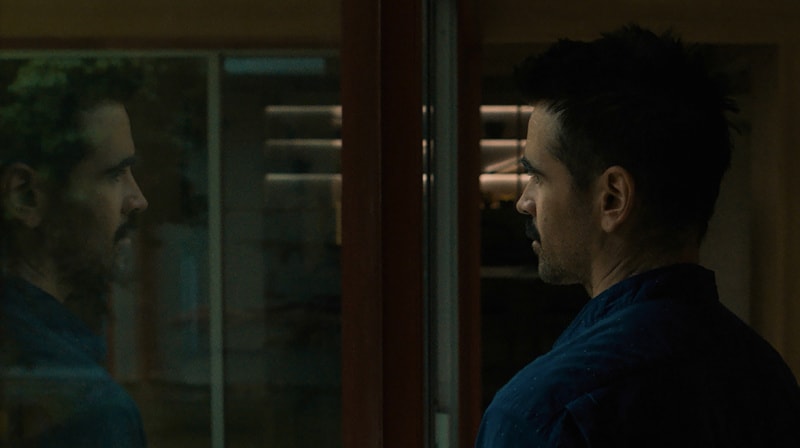This review of Kogonada’s After Yang is part of our 2022 Sundance Film Festival coverage. For more reviews and essays, visit our Sundance tab.
Starvation sits at the center of Kogonada‘s sophomore feature, After Yang. It’s not a physical hunger but an emotional ache. Father, mother, and daughter wander further adrift when their mechanical family member, Yang (Justin H. Min), malfunctions and falls catatonic. He was more than their babysitter, photographer, and member of their competitive dance team. He was their observer, their documentarian — they just didn’t know it.
Within Yang is the love they’ve lost, the humanity they’ve forgotten. The techno-sapien’s collapse offers them a chance to crack him open and pull themselves out. Yang’s dead eyes act as a mirror better than any other in their house.
Jake (Colin Farrell) and Kyra (Jodie Turner-Smith) purchased Yang to care for their adopted daughter, Mika (Malea Emma Tjandrawidjaja), hoping to maintain a connection to her biological heritage through his bottomless knowledge regarding Chinese history and trivia. The techno-sapien grew into something more than a teacher and maybe more than a brother. Replacing him with another is not only financially infeasible but psychologically dangerous.
Kyra wants Mika to accept this sudden grief, but Jake is not eager to step up and be more present as a father. Yang allowed him to spend his days and late evenings at his teashop, annoying customers with his sanctimonious refusal to carry crystals over proper leaves. If he cannot repair Yang, he’ll be required to have a hard conversation with his daughter and an even harder one with his wife. It’s best to find a low-budget technician willing to jumpstart the robot.
Through these repairs, a discovery is made. Yang has recorded his time with the family in microbursts. Given access to these files, Jake begins a secret odyssey into Yang, and what he encounters there radically alters his perception of his property, family, and life.
Like Columbus, Kogonada’s previous film, After Yang is meticulously constructed. His camera sits still, asking you to hang back, watch, and don’t blink. Everything in the frame appears carefully chosen, arduously reviewed, and judged. On the first watch, you’re already excited for the second one. Scenes will play very differently once we’ve processed the narrative entirely. It’s an odd sensation to realize what you’re seeing is not entirely seen at the moment. The anticipation for revelation hangs over everything, starting from After Yang‘s bopping opening credits sequence. There is more here. So much more.
Yes, there is also a distance felt between subject and creator. Kogonada makes relentlessly pristine films, but don’t mistake his distant, outside the toybox hand for a cold touch. After Yang is an exceptionally warm inward investigation, and as the film presses Jake’s inspection further into Yang, the poetry uncovered is sumptuously life-affirming. Yang’s microburst library is worthy of any Norton anthology. Give me the mp3, stat.
And the filmmaker’s withdrawn nature also replicates Jake’s journey. Colin Farrell holds onto his retreating father with tender movements. He doesn’t play Jake tranquil; he plays him motionless. Inside this silence, we project pain, terror, confusion. He is a man stuck in domesticity, a person who woke up one day a dad, unable to see a way out. Instead, Yang shows him a way in.
We’re told that Jake found the tea trade because he liked the idea of it. Or, at least, he liked the idea of it as Werner Herzog explained it to him through Les Blank’s All in This Tea documentary. Tea presents a person the chance to connect to the weather that produced the leaves, the soil, and the humans who fostered them.
Once upon a time, Jake sought a greater attachment to humanity, but life and the ethical and financial worries that come with it dulled his curiosity. In Yang’s memories, Jake rediscovers his taste for tea, his desire to understand the history, and the people that put him in the position he currently resides inside.
After Yang is science fiction, but only so that it can bestow a direct timeline, where a cup of tea’s history, and a robot’s history, can be consumed and digested in the same fashion. Trapped in his body, Jake could not see what he had, but his access to Yang and Yang’s observations of his family reiterates the miracle Jake wakes up to every day. He was starving despite the full spread before him. Now, he can eat again. He can drink again.
But that’s not the end, and Kogonada serves After Yang‘s final shots based on his devilish appetite. The film you’re watching is not the one that will ultimately live with you. Your final After Yang could be your third, fourth, or fiftieth watch. Who knows? Not me. Best of luck. All I know is that After Yang will grow with you through revisitation. Its last bits cause the viewer to reevaluate what they thought they knew just as Jake readdresses his previous conceptions. There is more here. Always.

